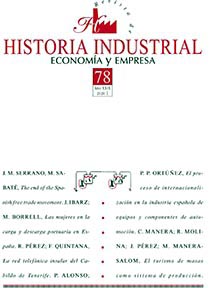Internationalization in the Spanish automotive equipment and components industry: Lingotes Especiales, 1968-2018
DOI:
https://doi.org/10.1344/rhi.v29i78.28848Keywords:
automotive, internationalization, competitiveness, Castilla y LeónAbstract
Lingotes Especiales was created in 1968 in Valladolid, in the middle of a boom in the automobile sector and the appliances industry, which became its main customers. Although it was born to serve the national market, like most industrial companies of that time, it is currently partially focused abroad, as it exports more than 75% of its products and has a production plant in India. Its process of internationalization followed three well-differentiated phases that would be framed within the evolutionary model of the Upsala School. Its international competitiveness has been based on a series of internal productive, commercial, organizational, and managerial advantages.
Downloads
Downloads
Published
How to Cite
Issue
Section
License
The author assigns all rights to the publisher. Creative Commons
The author who publishes in this journal agrees to the following terms:
- The author assigns all intellectual property rights exclusively to the publisher for the entire duration of the applicable intellectual property rights.
- The publisher will distribute the texts under the Creative Commons Attribution License, which allows others to share the work, provided that they acknowledge the authorship, its initial publication in this journal, and the conditions of the license.





